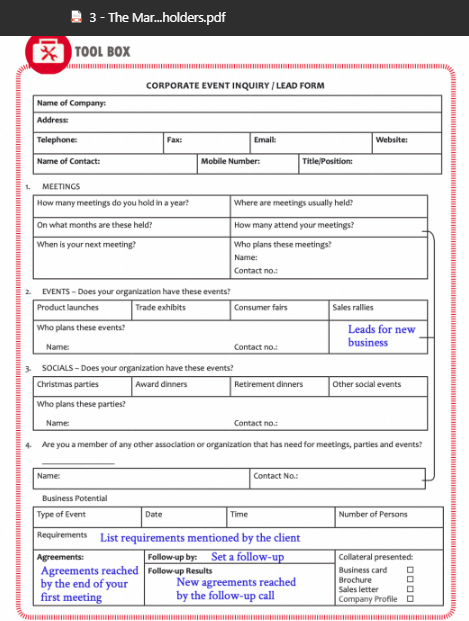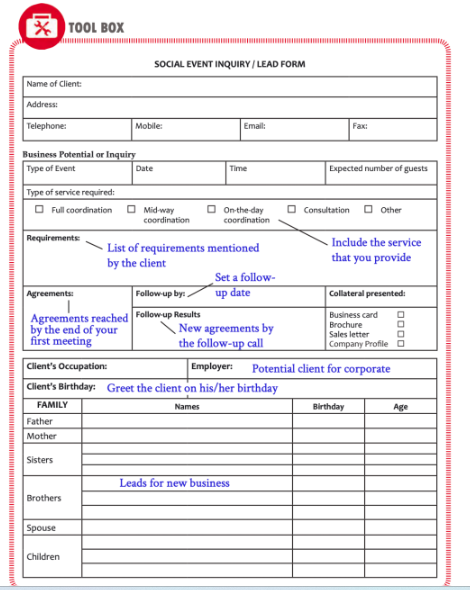MICE - L3: The Market for Events and the Event Stakeholders
1/27
There's no tags or description
Looks like no tags are added yet.
Name | Mastery | Learn | Test | Matching | Spaced |
|---|
No study sessions yet.
28 Terms
The Market for Events
and the Event
Stakeholders
Learning Objectives
Upon completion of this lesson, students should be able to:
1. Identify the target market for events;
2. Understand the needs of different groups;
3. Know who the event stakeholders are; and
4. Understand the concerns of event stakeholders.
Introduction
• Events are unique happenings that bring people: to celebrate, to commune, to convene, or for commerce.
• For business such as hotels, restaurants, catering facilities, entertainment and leisure venues, these events account for majority of sales.
• In the current decade, event venues came to fore-convention and exhibition centres, gardens, banquet halls, air-conditioned tents and even warehouses built especially for meetings, parties and events.
Introduction
Classification of Events
• Social events are typically gatherings of families and friends.
• Corporate events are those hosted by companies or organisations in pursuit of organisational objectives.
• Social events
are typically gatherings of families and friends.
• Corporate events
are those hosted by companies or organisations in pursuit of organisational objectives.
Individuals and Families
• are the typical prospects for life-cycle events.
• hold parties to celebrate, and to commune and rekindle relationships.
• are usually less formal in decision-making when it comes to events.
Organizations
• Organizations are the typical prospects for events to convene and for commerce, commonly referred to as corporate events.
• They compose the market for meetings, seminars, conferences, conventions, product launches, bazaars, selling events, sales promotion activities, office parties, incentive trips, and recreational activities.
• For companies, events are a means to help achieve corporate objectives, to support corporate functions (such as training, people management, or marketing) or to solve business problems.
Organizations
Categories of Associations
1. Trade associations which are made up of individuals and corporations that operate within an industry, or are bound by similar business concerns;
2. Professional associations that are formed by individuals in a common or affiliated profession.
3. Non-profit organizations which include social, military, educational, religious, and fraternal group or SMERFs.
1. Trade associations
which are made up of individuals and corporations that operate within an industry, or are bound by similar business concerns;
2. Professional associations
that are formed by individuals in a common or affiliated profession.
3. Non-profit organizations
which include social, military, educational, religious, and fraternal group or SMERFs.
Organizations
• Events for companies and associations are staged for various reasons to share ideas, to educate, to sell or market a product, to provide information, to motivate people, to strengthen corporate image, and to make people aware, among others.
• But for all, one common objective and measure for success is return on investment — to get something (not necessarily in monetary terms) out of the event.
• Organizations usually give the responsibility for an event to an event committee.
Organizations
• Some questions that the Event Manager must find answers to
are:
1. Who will make major decisions regarding the event?
2. What decisions can members of the event committee influence? What is their level of influence?
3. Are there others within the organization who could influence the decision? What is their level of influence?
4. What evaluation criteria will each decision-maker use?
Organizations
Factors Affecting Decision Making in Corporate Events
• External business environment: economic conditions, customer demographics, the natural environment, competition, technology, government and industry regulations
• Internal organization: the organization's objectives, policies, systems
• Interpersonal factors: authority, status, and relationship of decision makers
• The individual decision-maker: job position, age, education, personal preferences
• External business environment:
economic conditions, customer demographics, the natural environment, competition, technology, government and industry regulations
• Internal organization:
the organization's objectives, policies, systems
• Interpersonal factors:
authority, status, and relationship of decision makers
• The individual decision-maker:
job position, age, education, personal preferences
Leads and Inquiries
• In the event business, building contacts is essential.
• Take every opportunity to spot potential clients.


Event Stakeholders
• The Host. This is the group or person who is giving the event. The host may be the originator or champion of the idea to gather people together for a particular occasion; the main celebrator; or the one financing all expenses for the event.
• The Guests. These are the people attending the event; they are variously called audience, participants, attendees or visitors.
• The Event Committee. This refers to the group involved in the planning and execution of an event.
• The Financer. This is the money-man – the one who foots the bill.
• The Suppliers. The event manager works with other companies that will bring the event concept into reality. These companies also stake their time, resources and reputation on the event.
• The Host.
This is the group or person who is giving the event. The host may be the originator or champion of the idea to gather people together for a particular occasion; the main celebrator; or the one financing all expenses for the event.
• The Guests.
These are the people attending the event; they are variously called audience, participants, attendees or visitors.
• The Event Committee.
This refers to the group involved in the planning and execution of an event.
• The Financer.
This is the money-man – the one who foots the bill.
• The Suppliers.
The event manager works with other companies that will bring the event concept into reality. These companies also stake their time, resources and reputation on the event.
• The Externals.
These include other entities external to the host or the event manager, but have a financial, emotional, political, social or personal interest in the event. Government regulatory agencies, the media, the local government, the community, corporate shareholders, etc. might have their own stake on the event – and it is the job of the event manager to make sure that all concerns are duly addressed.